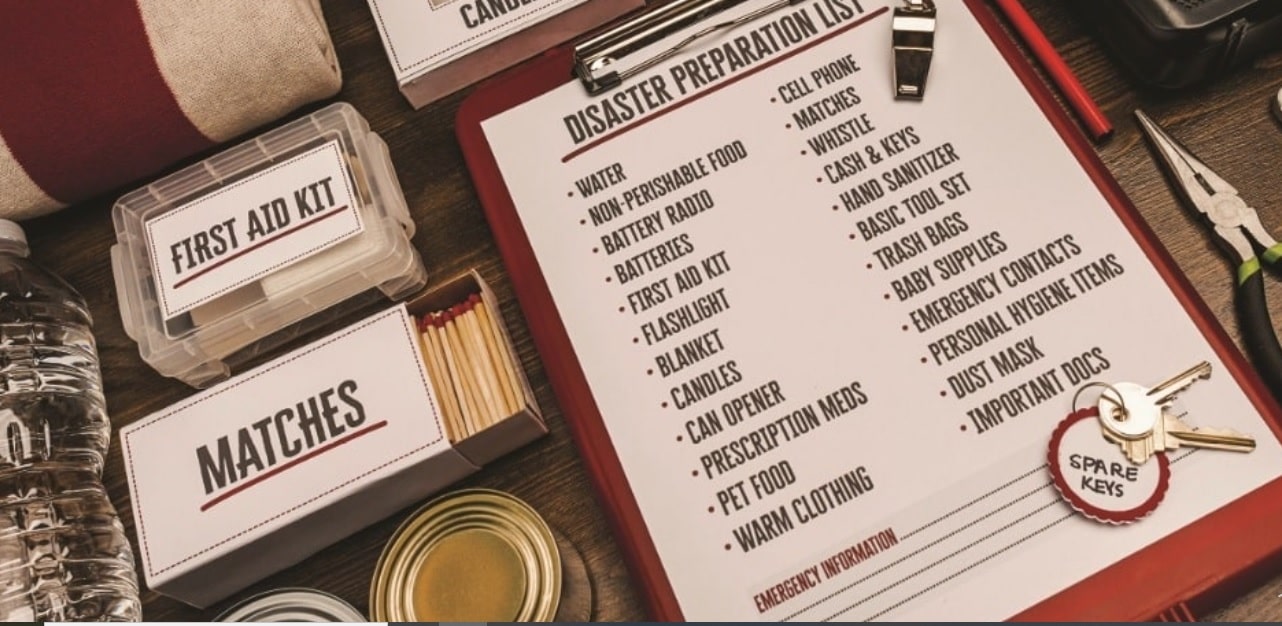Natural disasters, such as hurricanes, floods, tornados and wildfires can be stressful and devastating for persons living with a chronic disease. Here are tips to help reduce the risk of illness or serious health complications if a disaster strikes.
General Planning
- Make an emergency plan and a supply kit. Maintain at least a three-day supply of water, food, and medicine. Consider signing up for SMART911, Code Red, or your local county registry. These services help first responders identify people who may need assistance in a disaster.
- If you need to leave your home, know where to go (e.g., family members house, shelter) and be prepared to leave quickly. Have medicines, medical records, insurance information, and healthcare provider’s information with you.
- Ask your doctor for an extra supply of prescribed medicines, and have a list of all prescription medicines (including name, dose, and pharmacy information). If staying in a shelter or temporary housing, tell the staff about your health issues, special needs and any medicines you are taking.
- Keep medicines, supplies, and equipment out of the heat and in a safe and waterproof location. If you use medical equipment that works with electricity, learn How to Prepare and Handle Power Outages.
- Check if the Emergency Prescription Assistance Program (EPAP) is activated after a disaster. This free service helps residents get medicine, medical supplies, medical equipment and vaccines that were lost, stolen, or damaged due to the disaster. Call 855-793-7470 to enroll or visit the EPAP website. Check RX Open to find open pharmacies.
- Take steps to avoid getting an infection or illness. Clean up, disinfect, and wash your hands often, and stay away from moldy or dirty places. If you do not have soap and clean water, use an alcohol-based hand sanitizer. Seek immediate medical care if a wound develops redness or swelling, or if you have other signs of infection, such as fever, increasing pain, shortness of breath, confusion, disorientation, or high heart rate.
- During or after a natural disaster, it may be hard to find the food that you usually eat, particularly if you are on a special diet. Try to eat as healthy as possible by choosing foods that are lower in added sugars and salt.
- If you feel overwhelmed, reach out to family, friends, support groups, or a healthcare professional for support. Engaging in physical activity can help you to reduce stress, manage your condition and cope with a natural disaster.

Chronic Disease Specifics
Here are examples of common chronic conditions and things you can do to keep you and/or a loved one safe during a disaster.
Heart Disease and Stroke
- Stress from a disaster can lead to heart disease symptoms. Know the signs and symptoms of heart attacks and stroke.
- Disasters may cause increases in blood pressure. Monitor your blood pressure regularly, particularly if you have high blood pressure.
- Wildfire smoke and disaster-related air pollution can cause an increase in heart disease symptoms, such as chest pain, heart attacks, difficulty breathing, abnormal heart beating, or worsening symptoms of heart failure and stroke. Seek medical attention if you or someone you know is experiencing these symptoms.
- Get enough sleep to protect your heart health.
Diabetes
- Follow the Diabetes Preparedness Plan. Store three days of diabetes supplies and consider having an extra glucagon emergency kit.
- Keep your insulin, supplies, and equipment in a safe location. Insulin remains usable for 28 days at room temperature up to 86°F. Learn how to store insulin.
- Check your feet every day for cuts, redness, swelling, sores, blisters, corns, calluses, or any other change to the skin or nails. Call a healthcare provider as soon as possible if you see an injury or wound.
- For more information visit the Diabetes Disaster Response website or call 1-800-342-2383.
Kidney Disease: Dialysis Care
- Call your dialysis center to see if they are open or your local health department. They may be able to assist with transportation to the dialysis center or recommend another location if yours is closed. If you need assistance or are having difficulty contacting your dialysis clinic, call the Kidney Community Emergency Response (KCER) Hotline at 1-866-901-3773.
- If you are unable to get your treatments, follow the 3-Day Emergency Diet. If you are pregnant or have an infant or child who is on dialysis, talk to your doctor or dietician about modifications to this diet. This plan could save your life or the life of your child.
- If you have a home dialysis machine, you may be able to do manual exchanges until the power comes back on. Consider buying a small backup generator so you have continuous power.

Cancer
- Have a summary of your cancer treatment plan including the type of cancer you have, treatment received, physician contact information, and a list of your medicines and doses.
- If you have a Cancer Survivorship Care Plan, bring it with you if you need to leave your home.
- If you are being treated with chemotherapy, watch for signs of an infection, such as chills and sweats, a sore throat or other pain, nasal congestion, or vomiting. Call a doctor right away, if you get a fever.
- Learn more about How to Get Ready for a Natural Disaster When You Have Cancer and Coping With Cancer After a Natural Disaster. For more information, call the National Cancer Information Center at 800-227-2345
Alzheimer’s Disease and other Dementias
- Disasters can be especially upsetting and confusing for individuals with Alzheimer’s or related dementia. Be aware of signs of anxiety or agitation in persons with dementia and be prepared with strategies to calm them during times of stress.
- If you have a family member in a residential facility, find out about its disaster plans.
- When appropriate, share the diagnosis with others, such as hotel or shelter staff, family members and airline attendants, so they can better assist.
- Caregivers should be aware of the potential for individuals with dementia to wander. Try to stay together or with a group if evacuated. Do not leave the person with dementia alone.
Additional Preparedness and Disaster Resources
- Epilepsy and Disaster Preparedness
- Emergency Preparedness for Older Adults and Caregivers
Source: CDC






